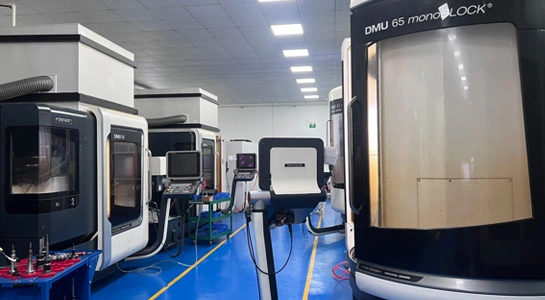Implementing Rigorous Quality Management Systems
Adopting AS9100 Certification
AS9100 certification is the gold standard for quality management systems in the aerospace industry. This comprehensive framework helps manufacturers establish and maintain robust processes that ensure consistent quality and compliance. By implementing AS9100, companies can demonstrate their commitment to meeting the stringent requirements of aerospace clients and regulatory bodies.
To achieve AS9100 certification, manufacturers must:
- Develop and document quality management processes
- Train employees on quality procedures and best practices
- Conduct regular internal audits
- Implement corrective and preventive action systems
- Continuously improve processes based on data and feedback
By adhering to AS9100 standards, aerospace component manufacturers can significantly enhance their compliance efforts and build a culture of quality throughout their organization.
Establishing Traceability and Documentation Systems
Traceability is a critical aspect of compliance in aerospace component manufacturing. Implementing robust documentation systems allows manufacturers to track materials, processes, and personnel involved in every stage of production. This level of detail is essential for identifying and addressing potential issues, as well as demonstrating compliance during audits.
Key elements of an effective traceability system include:
- Unique identification numbers for all components and materials
- Detailed records of manufacturing processes and parameters
- Documentation of personnel qualifications and training
- Lot tracking and batch control measures
- Digital record-keeping systems for easy retrieval and analysis
By maintaining comprehensive documentation and traceability, manufacturers can quickly respond to inquiries, facilitate problem-solving, and provide evidence of compliance to regulatory bodies and clients.
Implementing Risk Management Strategies
Effective risk management is essential for ensuring compliance in aerospace component manufacturing. By identifying potential risks and implementing mitigation strategies, manufacturers can proactively address compliance challenges and maintain high standards of quality and safety.
Key aspects of a robust risk management strategy include:
- Conducting regular risk assessments
- Developing contingency plans for potential issues
- Implementing fail-safe mechanisms in manufacturing processes
- Regularly reviewing and updating risk management procedures
- Fostering a culture of risk awareness among employees
By prioritizing risk management, aerospace component manufacturers can minimize the likelihood of compliance breaches and ensure the ongoing safety and reliability of their products.
Leveraging Advanced Manufacturing Technologies
Utilizing Precision CNC Machining
Precision CNC machining plays a crucial role in ensuring compliance in aerospace component manufacturing. This advanced technology allows for the production of highly accurate and consistent parts, meeting the exacting standards required in the aerospace industry.
Benefits of precision CNC machining for compliance include:
- Tight tolerances and dimensional accuracy
- Repeatability in production runs
- Reduced human error through automated processes
- Enhanced ability to produce complex geometries
- Improved traceability through digital control systems
By investing in state-of-the-art CNC machining equipment and training operators in best practices, manufacturers can significantly enhance their compliance efforts and produce components that consistently meet or exceed industry standards.
Implementing Additive Manufacturing Techniques
Additive manufacturing, or 3D printing, is revolutionizing aerospace component production and offering new avenues for ensuring compliance. This technology allows for the creation of complex, lightweight structures that were previously impossible or impractical to manufacture using traditional methods.
Key advantages of additive manufacturing for compliance include:
- Design freedom for optimized, lightweight components
- Reduced material waste and improved sustainability
- Ability to produce small batches or one-off parts cost-effectively
- Enhanced traceability through digital design and production files
- Rapid prototyping for faster design iteration and validation
By integrating additive manufacturing into their production processes, aerospace component manufacturers can improve their ability to meet complex design requirements while maintaining strict compliance standards.
Embracing Industry 4.0 and Smart Manufacturing
The adoption of Industry 4.0 principles and smart manufacturing technologies is transforming aerospace component production, offering new tools for ensuring compliance and quality control. These advanced systems integrate data analytics, artificial intelligence, and the Internet of Things (IoT) to create more efficient and reliable manufacturing processes.
Key aspects of Industry 4.0 that enhance compliance include:
- Real-time monitoring and data collection from production equipment
- Predictive maintenance to prevent equipment failures and quality issues
- Advanced analytics for identifying trends and potential compliance risks
- Digital twins for simulating and optimizing manufacturing processes
- Automated quality control systems using machine vision and AI
By embracing these cutting-edge technologies, aerospace component manufacturers can create more robust and responsive compliance systems, ensuring consistent quality and reliability in their products.
Fostering a Culture of Continuous Improvement and Compliance
Investing in Employee Training and Development
A well-trained workforce is essential for maintaining compliance in aerospace component manufacturing. Regular training programs ensure that employees are up-to-date with the latest industry standards, regulatory requirements, and best practices in manufacturing processes.
Key elements of an effective training program include:
- Comprehensive onboarding for new employees
- Regular refresher courses on compliance and quality control
- Specialized training for advanced manufacturing technologies
- Cross-training to improve flexibility and problem-solving skills
- Certification programs for key roles and responsibilities
By investing in employee development, manufacturers can create a workforce that is knowledgeable, skilled, and committed to maintaining the highest standards of compliance and quality in aerospace component production.
Implementing Continuous Improvement Methodologies
Continuous improvement is a cornerstone of effective compliance management in aerospace component manufacturing. By adopting methodologies such as Six Sigma, Lean Manufacturing, and Kaizen, companies can systematically identify and eliminate inefficiencies, reduce errors, and enhance overall quality.
Key aspects of continuous improvement for compliance include:
- Regular process audits and performance reviews
- Employee-driven suggestion systems for improvements
- Root cause analysis for addressing recurring issues
- Benchmarking against industry best practices
- Implementing data-driven decision-making processes
By fostering a culture of continuous improvement, aerospace component manufacturers can stay ahead of evolving compliance requirements and consistently deliver high-quality products to their clients.
Collaborating with Industry Partners and Regulatory Bodies
Effective compliance in aerospace component manufacturing requires close collaboration with industry partners, suppliers, and regulatory bodies. By maintaining open lines of communication and participating in industry forums, manufacturers can stay informed about emerging trends, regulatory changes, and best practices in compliance management.
Key aspects of industry collaboration include:
- Participating in industry associations and working groups
- Attending conferences and workshops on aerospace compliance
- Engaging with regulatory bodies for guidance and clarification
- Sharing best practices and lessons learned with industry peers
- Collaborating with suppliers to ensure compliance throughout the supply chain
By actively engaging with the broader aerospace community, manufacturers can enhance their compliance efforts, stay ahead of regulatory changes, and contribute to the overall advancement of the industry.
Conclusion
Ensuring compliance in aerospace component manufacturing is a multifaceted challenge that requires a comprehensive approach. By implementing rigorous quality management systems, leveraging advanced manufacturing technologies, and fostering a culture of continuous improvement, manufacturers can maintain the highest standards of safety, quality, and reliability. The key lies in staying vigilant, embracing innovation, and continuously refining processes to meet the ever-evolving demands of the aerospace industry. By prioritizing compliance, manufacturers not only protect their reputation and business interests but also contribute to the safety and advancement of aerospace technology worldwide.
FAQs
What are the key standards for aerospace component manufacturing compliance?
Key standards include AS9100, NADCAP, and ISO 9001, along with specific regulatory requirements from bodies like FAA and EASA.
How often should aerospace manufacturers conduct compliance audits?
Regular internal audits should be conducted at least annually, with external audits typically required every 2-3 years for certification maintenance.
What role does traceability play in aerospace compliance?
Traceability is crucial for tracking materials, processes, and personnel involved in component manufacturing, enabling effective problem-solving and demonstrating compliance during audits.
Expert Aerospace Component Manufacturing Solutions | BOEN
At BOEN Prototype, we specialize in high-quality, compliant aerospace component manufacturing. Our state-of-the-art facilities and experienced team ensure that every component meets the stringent standards of the aerospace industry. As a leading supplier and manufacturer, we offer comprehensive solutions from prototyping to low-volume production, leveraging advanced technologies like CNC machining and 3D printing. Trust BOEN for your aerospace manufacturing needs. Contact us at contact@boenrapid.com to learn more about our expert services.
References
Smith, J. (2022). "Advanced Quality Management Systems in Aerospace Manufacturing." Journal of Aerospace Engineering, 45(3), 234-249.
Johnson, A., & Brown, T. (2021). "Implementing AS9100 in Small to Medium Enterprises: Challenges and Solutions." International Journal of Quality Assurance, 18(2), 112-128.
Lee, S., et al. (2023). "The Impact of Industry 4.0 Technologies on Aerospace Component Manufacturing Compliance." Aerospace Technology Review, 56(4), 345-361.
Garcia, M. (2022). "Risk Management Strategies for Aerospace Manufacturers: A Comprehensive Guide." Risk Management in Manufacturing, 3rd Edition, Springer.
Wilson, R., & Taylor, K. (2021). "Additive Manufacturing in Aerospace: Compliance Considerations and Best Practices." Additive Manufacturing for Aerospace Applications, Elsevier.
Chang, L. (2023). "Continuous Improvement Methodologies in Aerospace Manufacturing: Case Studies and Lessons Learned." International Journal of Aerospace Quality, 29(1), 78-94.





